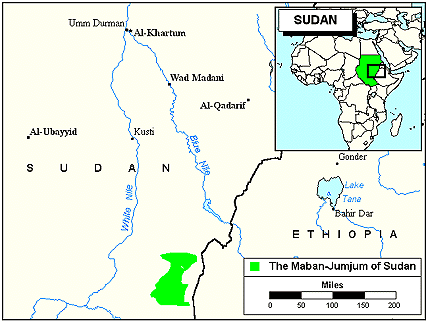|
|
Prayer Profile
The Maban-Jumjum of Sudan
![[IMAGE]](../images3/0473.jpg) The Maban-Jumjum are a sub-group of a larger race called the Shilluk. Although the Shilluk are approximately 28% Christian, some of the sub-groups, including the Maban-Jumjum, remain unreached. The original homeland of the Shilluk is believed to be somewhere east of the African Great Lakes. As both the population and the sizes of their herds increased, they migrated northward, reaching their present territory in the late fifteenth century. Today, they live along the banks of the White Nile.
The Maban-Jumjum are a sub-group of a larger race called the Shilluk. Although the Shilluk are approximately 28% Christian, some of the sub-groups, including the Maban-Jumjum, remain unreached. The original homeland of the Shilluk is believed to be somewhere east of the African Great Lakes. As both the population and the sizes of their herds increased, they migrated northward, reaching their present territory in the late fifteenth century. Today, they live along the banks of the White Nile.
Throughout the nineteenth century the the region where the Shilluk and several other tribes lived, was raided for slaves and ivory. Although slave stations were established in many areas, the Shilluk were well organized and able to deter the raiders. During the early twentieth century, the Shilluk way of life was greatly affected. Medical services, irrigation, modern roads, and the introduction of a European style government, all led to changes in their culture.
What are their lives like?
Maban-Jumjum communities can be likened to beads on a string, because they are spread out along the banks of the White Nile River about 200 yards apart. Several thatch-roofed mud huts make up one settlement. Each settlement represents one family's lineage and is headed by a chief. The chief settles disputes and maintains order in his settlement.
At the center of the Shilluk territory is the capital, Pachoda, where the Shilluk king, or reth, resides. The reth is attributed with spiritual powers and is thought to be divine. Each reth is also believed to be a reincarnation of the first Shilluk king, named Nyikang.
The Maban-Jumjum make their living by raising small herds of cattle, along with sheep, goats, pigs and hens. The cattle are given the utmost care because they are so important to the survival of the tribes. The cattle are even tied near fires at night to keep insects from biting them.
The Maban-Jumjum must plant crops in gardens outside the villages in order to maintain an adequate diet. Milk supplies are often insufficient, since cattle diseases have taken a toll on their herds. Millet, maize, sesame, beans, and tobacco are raised. The men also hunt hippopotamuses, antelope, buffalo, and giraffes. Spear fishing is another important means of obtaining food and the Maban-Jumjum are known as expert fishermen. While the men hunt and fish, the women tend the gardens, prepare the food, and make the cooking utensils.
The clothing and tribal markings worn by the Maban-Jumjum clearly set them apart from neighboring groups. Neither the men nor the women wear much clothing, but the men wear bracelets of ivory or wood on their wrists or upper arms. Six of the lower teeth are removed from the Maban-Jumjum while they are very young, unless they are in the royal family. Both the men and women have three to five rows of dots or scars on their foreheads, indicating their unmistakable tribal identity.
What are their beliefs?
The Maban-Jumjum follow their traditional ethnic beliefs. They worship Juok, a diety who is recognized as the creator god. Juok is thought to be omnipresent and is addressed through sacrifices or through the present reth (Shilluk king).
The Maban-Jumjum also believe in the power of the "evil eye." Envy or anger may cause a person with the evil eye to bring misfortune upon others. They use prayer, sacrifices, and magic in an attempt to safeguard themselves from this power.
While many African tribes believe that the birth of twins is a curse, the Maban-Jumjum consider it to be a blessing. In fact, twins are considered to be "children of god."
What are their needs?
Although two missions agencies are currently targeting the Maban-Jumjum, much work remains. Very few Christian resources are available in the Maban language. Added laborers and materials are greatly needed.
Prayer Points
- Ask God to grant wisdom and favor to the missions agencies that are targeting the Maban-Jumjum.
- Pray that the Lord will raise up long term workers to join the few who have already responded.
- Ask God to speed the completion of the Jesus film and other evangelistic materials into the Maban language.
- Pray that God will reveal Himself to these precious people through dreams and visions.
- Ask God to begin using the Maban-Jumjum Christians to reach out and share the Gospel with their own people.
- Take authority over the principalities and powers that are keeping the Maban-Jumjum bound.
- Ask God to raise up prayer teams that will begin breaking up the soil through intercession.
- Ask the Lord to raise up strong local churches among the Maban-Jumjum.

Statistics
Latest estimates from the World Evangelization Research Center.
THE PEOPLE
- People name: Maban-Jumjum
- Country: Sudan
- Their language: Maban
- Population:
- Largest religion:
- Christians: 4%
- Church members: 1,822
- Scriptures in their own language: New Testament
- Jesus Film in their own language: None
- Christian broadcasts in their own language: None
- Mission agencies working among this people: 2
- Persons who have heard the Gospel: 15,000 (32%)
- Persons who have never heard the Gospel: 30,600 (68%)
THEIR COUNTRY
- Country: Sudan
- Population:
- Major peoples in size order:
- Major religions:
- Number of denominations: 20
© Copyright 1997
Bethany World Prayer Center
This profile may be copied and distributed without obtaining permission
as long as it is not altered, bound, published
or used for profit purposes.
![[HOME BUTTON]](../graphics/home.jpg)
![[CALENDAR BUTTON]](../graphics/calico.jpg)
![[LIST BUTTON]](../graphics/listico.jpg)
[Home]
[Calendar]
[Country List]
|